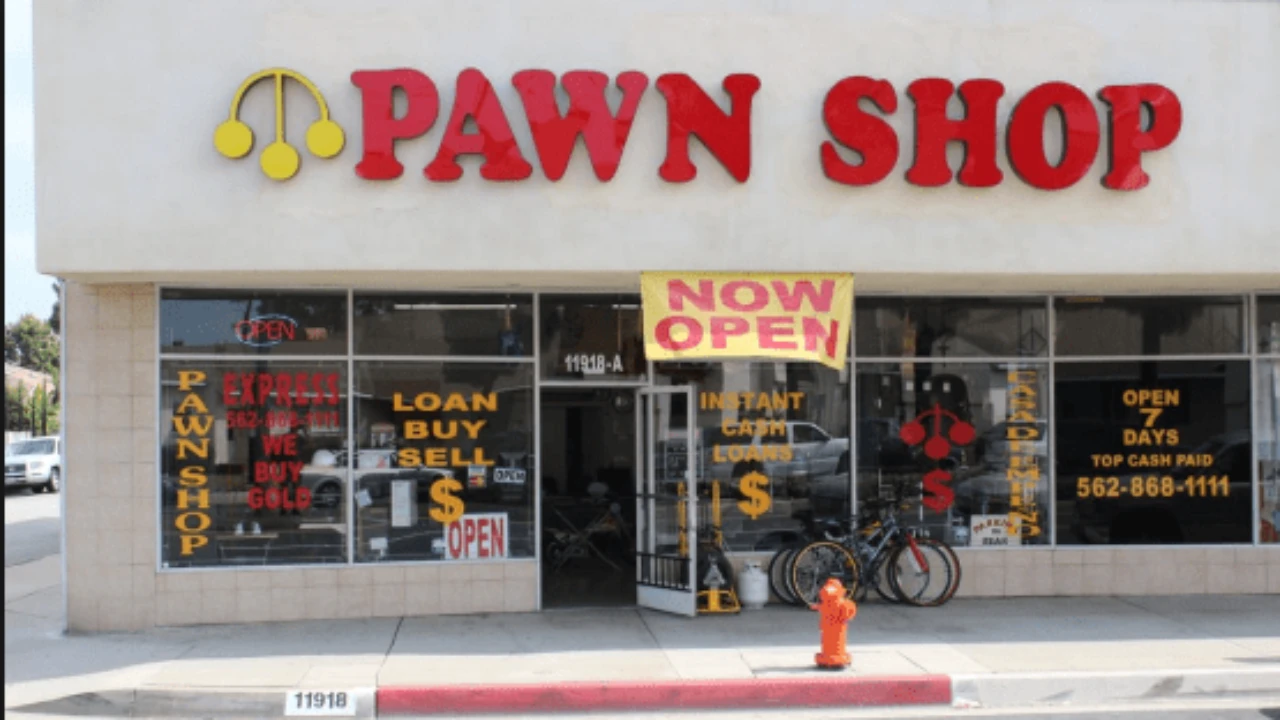Discovering Value in Unlikely Plac
Pawn Shops often evoke a mix of curiosity and skepticism. For many, they represent a realm of hidden treasures waiting to be uncovered, while for others, they might conjure images of desperate individuals trading their valuables for quick cash. Regardless of the perception, pawn shops play a significant role in the economy, providing unique opportunities for both buyers and sellers. This article delves into the world of pawn shops, exploring their history, operations, the types of items they deal with, and tips for navigating this often-misunderstood marketplace.
The History of Pawn Shops
The concept of pawning items for cash dates back thousands of years. Historical records suggest that pawn shops originated in ancient China around 3,000 B.C., where merchants offered loans in exchange for valuables. This practice spread to Greece and Rome, where wealthy citizens would pawn items to fund their ventures.
In the Middle Ages, pawnbroking became more formalized in Europe, often associated with charitable organizations. The famous three-ball symbol of pawnbroking, which is still recognized today, originated from the Lombards of Italy, who used it as a sign for their money-lending services. The Lombards, known for their financial acumen, set the groundwork for modern pawn shops, establishing principles that still apply today.
In the United States, pawn shops flourished during the Gold Rush in the 19th century, providing miners with quick cash in exchange for their possessions. Over the years, pawn shops have evolved, becoming more regulated and integrated into the modern financial landscape. Today, they serve as crucial access points for individuals seeking short-term loans without the need for extensive credit checks.
Key Historical Figures
Notable figures have played a role in shaping the pawn industry. For instance, the emergence of influential pawnbrokers in major cities helped establish the legitimacy of the profession. Figures like the notorious pawnbroker in Charles Dickens’ “Oliver Twist” illustrate the complex relationship society has had with pawnbroking throughout history. These figures often acted as community lenders, providing financial support to those in need while sometimes being viewed with suspicion.
How Pawn Shops Operate
Pawn shops primarily operate on a simple business model: they provide loans based on the value of items brought in by customers. When someone pawns an item, they receive a loan that is typically a fraction of the item’s appraised value. The borrower has a set period, usually 30 to 90 days, to repay the loan with interest. If they fail to repay, the pawn shop retains ownership of the item and can resell it to recoup their losses.
The Appraisal Process
The process begins with an appraisal, where a pawnbroker assesses the item’s value based on various factors, including condition, demand, and market trends. Unlike traditional loans, pawn shops do not require credit checks or extensive paperwork, making them an accessible option for many individuals.
Pawnbrokers often have expertise in specific areas, such as jewelry or electronics, allowing them to provide accurate assessments. The appraisal process may involve testing the authenticity of items, particularly with precious metals and gemstones. For example, a pawnbroker might use a jeweler’s loupe to examine the clarity and cut of a diamond or conduct an acid test on gold to determine its karat value.
Loan Terms and Conditions
When a customer agrees to pawn an item, they sign a contract that outlines the loan amount, interest rate, and repayment terms. Interest rates can vary widely depending on the state and the specific pawn shop, often ranging from 3% to 25% per month. It’s essential for customers to understand these terms, as failure to repay the loan can result in losing the item.
The Types of Items Commonly Found in Pawn Shops
One of the most intriguing aspects of pawn shops is the diverse range of items they handle. While jewelry and electronics are commonly associated with pawning, these establishments deal with an array of goods. Here are some of the most frequently encountered categories:
1. Jewelry
Jewelry is perhaps the most recognizable item in pawn shops. Gold, silver, and diamond pieces hold intrinsic value, making them attractive for both pawnbrokers and customers. Many pawn shops specialize in jewelry appraisal and often have skilled gemologists on staff to assess the quality and value of items.
Current Trends: The demand for vintage and designer jewelry has surged, with many buyers seeking unique pieces that reflect personal style. This trend is influenced by social media platforms, where influencers showcase one-of-a-kind jewelry. For example, the popularity of vintage gold chains and statement rings has led to a resurgence in demand at pawn shops.
2. Electronics
From smartphones to gaming consoles, electronics are a popular category in pawn shops. With technology evolving rapidly, many consumers upgrade their devices frequently, leading to a steady supply of used electronics. Pawn shops can offer significant savings on these items, making them appealing to budget-conscious shoppers.
Warranties and Returns: Some pawn shops provide limited warranties on electronics, offering customers peace of mind. It’s essential to inquire about return policies before making a purchase. Buyers should also check for any included accessories, like chargers or original packaging, which can increase the item’s value.
3. Musical Instruments
Musical instruments are another common find in pawn shops. Guitars, keyboards, and even professional-grade equipment can often be purchased at a fraction of their retail price. For musicians looking to expand their collection without breaking the bank, pawn shops can be a goldmine.
Expert Insights: Local musicians often frequent pawn shops, sharing tips on the best finds. Many pawn shops also collaborate with music schools, providing affordable instruments for students. A band might find a vintage amplifier or a unique synthesizer, showcasing the treasures that await those who explore.
4. Collectibles and Antiques
Pawn shops often feature unique collectibles and antiques that can pique the interest of enthusiasts and collectors. Items like vintage coins, rare stamps, and unique memorabilia can be found, sometimes at prices that reflect their true value only to those in the know.
Case Studies: Several collectors have shared stories of finding rare items in pawn shops that have significantly increased in value. For instance, a vintage comic book purchased for a few dollars could be worth thousands today. Similarly, rare coins often appreciate over time, making pawn shops an excellent place for collectors to seek hidden gems.
5. Firearms
In many areas, pawn shops also deal in firearms, adhering to strict regulations. Buyers seeking a firearm may find a variety of options, while sellers can access quick cash through the pawn system. It’s crucial for individuals to understand local laws and regulations surrounding the sale and purchase of firearms.
Legal Considerations: Regulations surrounding the sale and purchase of firearms vary by state, so it’s essential for buyers and sellers to be aware of local laws. Some pawn shops may require background checks or additional paperwork, ensuring compliance with federal and state laws.
The Benefits of Buying and Selling at Pawn Shops
Pawn shops offer numerous advantages for both buyers and sellers, making them a viable option for many individuals.
Benefits for Buyers
- Affordable Prices: One of the primary attractions of pawn shops is the potential for significant savings. Items are often priced below their retail value, allowing savvy shoppers to find deals.
- Unique Finds: Pawn shops frequently carry one-of-a-kind items that are not available in traditional retail stores. This uniqueness can be particularly appealing to collectors and those seeking something special.
- Negotiation Opportunities: Unlike conventional retailers, pawn shop prices are often negotiable. Customers can engage in friendly haggling, potentially securing an even better deal.
- Immediate Access: For those who need items quickly, pawn shops offer immediate access to goods without the waiting period typically associated with online purchases.
- Supporting Local Businesses: Purchasing from pawn shops often means supporting local businesses, which can be beneficial to the community’s economy. Many pawn shops also engage in local initiatives, further strengthening their community ties.
Benefits for Sellers
- Quick Cash: Pawn shops provide an accessible way to obtain cash for unwanted or unused items. This can be particularly beneficial in emergencies or when cash flow is tight.
- No Credit Checks: Unlike traditional loans, pawn shops do not require credit checks, making them a viable option for individuals with poor credit.
- Opportunity to Reclaim Items: If sellers repay their loans, they can reclaim their items. This aspect distinguishes pawn shops from typical resale options.
- Simplicity of Process: Selling items at pawn shops is straightforward. Sellers can quickly appraise their items, receive cash, and walk away without extensive paperwork.
- A Safe and Confidential Environment: For many, pawn shops provide a discreet way to sell valuables without the stigma associated with traditional selling avenues. This confidentiality can be appealing for those looking to avoid unwanted attention.
Tips for Navigating Pawn Shops
While pawn shops can be a treasure trove of opportunities, navigating them successfully requires some knowledge. Here are some tips for buyers and sellers:
For Buyers
- Do Your Research: Before visiting a pawn shop, research the value of items you are interested in. This knowledge can help you identify fair prices and negotiate effectively.
- Inspect Items Carefully: Take the time to examine items for quality and authenticity. Check for any damages or defects, especially in electronics and jewelry. Consider bringing a knowledgeable friend or using your smartphone to look up comparable items online.
- Be Prepared to Negotiate: Don’t be afraid to haggle. Pawn shop owners expect negotiation, and you may be able to secure a better deal. Approach negotiations respectfully, emphasizing that you appreciate the item’s value while expressing your budget constraints.
- Check Return Policies: Some pawn shops have return policies, while others do not. Always ask about returns before making a purchase. Understanding the return policy can help avoid disappointment if the item doesn’t meet your expectations.
- Build Relationships: Establishing a rapport with pawnbrokers can lead to better deals in the future. Frequent customers often receive preferential treatment and may be informed about new arrivals or special promotions.
For Sellers
- Know Your Item’s Worth: Research the market value of your item before visiting a pawn shop. This will help you understand what to expect in terms of loans or offers.
- Present Items Well: Clean and present your items in good condition. This can positively influence the appraisal value. Items that look cared for are more likely to attract better offers.
- Be Realistic About Expectations: Understand that pawn shops typically offer a fraction of an item’s retail value. Be prepared for offers that may seem low compared to what you expect.
- Shop Around: If you have multiple items to sell, visit several pawn shops to compare offers. Different shops may appraise items differently. This comparison can help you find the best deal.
- Be Prepared for Questions: Pawnbrokers may ask questions about the item’s history or why you’re selling it. Being honest and transparent can build trust and may lead to a better offer.
The Cultural Impact of Pawn Shops
Pawn shops are more than just places for buying and selling items; they reflect cultural trends and economic realities. They have been featured in countless television shows and movies, often depicted as places filled with intrigue and drama. Shows like “Pawn Stars” have popularized the industry, showcasing the unique items and stories that emerge from pawn shops.
Community Role
In many communities, pawn shops also serve as informal community centers, where individuals gather to share stories and experiences. This social aspect can enhance the appeal of pawn shops, turning them into more than just transactional spaces. Local events, charity drives, and educational workshops are often held in conjunction with pawn shops, fostering community engagement. For instance, a pawn shop might host a community night where residents can learn about jewelry appraisal or electronics repair.
Personal Stories and Anecdotes
Real-life stories from customers and pawnbrokers illustrate the unique experiences that can occur in pawn shops. For instance, a musician might share how they found a vintage guitar that transformed their sound, while a pawnbroker could recount the story of a family heirloom that was brought in for a loan during tough financial times.
Anecdote Example: One pawnbroker in a bustling city recounted a day when a customer came in with a dusty box of old toys. After a thorough appraisal, they discovered rare action figures worth thousands. The emotional journey of returning a piece of childhood nostalgia to a collector highlights the deep connections people have with their items. This anecdote emphasizes the unpredictable nature of pawn shops, where everyday objects can hold immense value.
The Future of Pawn Shops
As technology advances, pawn shops are evolving to meet new demands. Online pawn shops are becoming increasingly popular, offering convenience for both buyers and sellers. This shift allows individuals to pawn items from the comfort of their homes, expanding the reach of traditional pawn services.
Trends Affecting the Industry
- Digital Platforms: The rise of e-commerce has led to the emergence of online pawn services, making it easier for individuals to access loans and purchase items. Websites and apps dedicated to pawning have streamlined the process, allowing users to upload pictures and descriptions of items for appraisal.
- Sustainability: As consumers become more environmentally conscious, the appeal of second-hand goods is rising. Pawn shops are well-positioned to capitalize on this trend by promoting the benefits of reusing and recycling items. Many customers are now looking for ways to reduce their carbon footprint, making second-hand shopping an attractive option.
- Economic Challenges: Economic downturns often lead to increased foot traffic in pawn shops, as individuals seek quick cash solutions. This cyclical nature of pawnbroking highlights its importance in the financial landscape. In times of financial crisis, pawn shops often see a spike in customers needing immediate cash.
- Regulatory Changes: As the pawn industry grows, regulatory changes may affect how pawn shops operate. Keeping abreast of these changes will be crucial for both pawnbrokers and customers to ensure compliance and protect their rights.
Conclusion
Pawn shops represent a unique intersection of commerce, culture, and community. They offer valuable services to those in need of quick cash while also providing opportunities for buyers seeking affordable and unique items. By understanding how pawn shops operate and the benefits they offer, individuals can navigate this fascinating world with confidence. Whether you’re looking to buy, sell, or simply explore, pawn shops hold a wealth of hidden treasures waiting to be discovered.
In a rapidly changing economic landscape, pawn shops continue to adapt and thrive, offering an essential service that bridges the gap between buyers and sellers. Their enduring presence in communities reflects not just a marketplace but a dynamic cultural phenomenon, where every item tells a story and every transaction carries potential. So, the next time you pass by a pawn shop, consider stepping inside—you might just unlock a hidden treasure.for more posts read this networksights.com













Leave a Reply